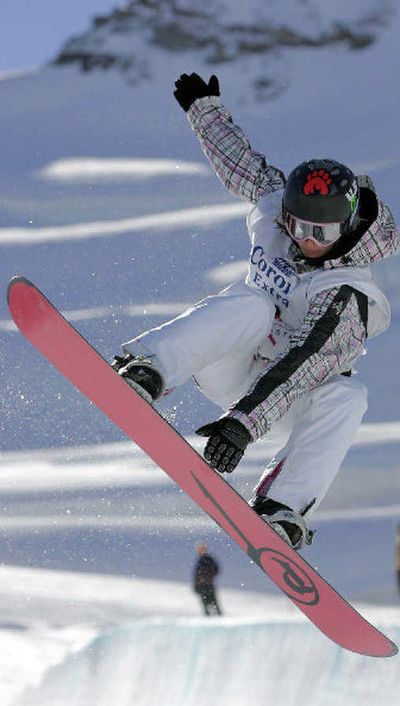Face it: She has the mug

BARDONECCHIA, Italy – Her name might not be familiar, but snowboarder Lindsey Jacobellis has become the familiar face of these Winter Games before touching snow in competition.
The 2005 world champion of snowboardcross (SBX) is the serene face on that ubiquitous Visa check-card commercial, a Kellogg’s Frosted Flakes cereal box and your local Dunkin Donuts counter, among a slew of ad deals.
“Lindsey is unquestionably a serious medal contender,” said Gabe Glosband, winter sports marketing director of Scott USA, which makes Jacobellis’ goggles.
“Her glowing smile and golden curls, coupled with her proven results, make Lindsey an ideal spokesperson.”
The 20-year old Vermonter’s rise to fame is no miracle on ice, however.
Before the Olympic flame had been extinguished at the 2002 Winter Games, marketing executives at Visa and the U.S. Ski and Snowboard Association had identified Jacobellis as a potential star.
Jacobellis also regularly competes in halfpipe, though she will not compete in the event in Turin.
Snowboardcross, which is making its Olympic debut, brings out Jacobellis’ aggressive streak.
“It is not as laid back as halfpipe,” she said. “There’s a lot more energy around it.”
A variation of motocross, SBX racers battle down an undulating course riddled with bumps, big jumps, tight corners and elbow-jabbing battles for position.
“At the start, I focus on what I need to do,” Jacobellis said. “The key is to get a strong pull at the gate. For me, the races are won on the big jumps. Some of the girls are scared, but I just do it.”
Her marketing appeal? Now that’s another matter.
“The attention (from the Visa ad) is somewhat embarrassing,” she said. “I don’t get stopped on the street, but people do bring it up at snowboarding events. But if it helps get my face out there, it helps both me and the sport.”
She might be reticent, but Michael Lynch, Visa’s senior vice president of partnership marketing, is downright exuberant about her impact.
“Four years ago we knew that Lindsey had what it takes,” said Lynch, who saw Visa star potential in swimmer Michael Phelps and beach volleyball players Misty May and Kerri Walsh years before they became famous.
“In addition to the national television ad, she’s been featured on literally millions of inserts that go out in cardholder statements from member banks, as well as point-of-sale displays at stores.”
A Lindsey Jacobellis affinity Visa card also can be obtained through a U.S. Olympic Committee program that uses several top athletes. She’s also working on a Visa-sponsored program that raises money for Olympic hopefuls.
Jacobellis was the beneficiary of Visa-USOC training help earlier in her career. Now she’s paid an undisclosed amount directly from Visa. Her hefty portfolio includes deals made through the Olympic system and her agent, Josh Schwartz.
In the sometimes-edgy world of snowboarding, such close ties to marketers make some athletes nervous.
“Global mass marketing is a smart way of corruption. Enormous commercial powers are influencing us to do or buy stuff we really don’t need,” said Norway’s Terje Haakonsen, one of the world’s best snowboarders and a vocal opponent of the Olympics.
“All sporting organizations, not only the IOC, must have that in mind when they make events and especially snowboarding organizers as they are focusing on young people. Organizing snowboarding events takes a lot of money, and it’s not possible without sponsors. But you have to set strict rules on which sponsors you are working with.”